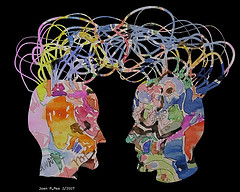2015: Sabrina Binte Selamat, Sathrin Kaur Saggi D/O Karamjit Singh
2014: Hideka Wada, Priyanka Kharbanda

Welcome to our blog on Linguistic Complexity!
We have attempted to made our blog on this subject accessible to linguistic junkies as well as those not so linguistically-inclined. You can navigate our blog and learn more about Linguistic Complexity by navigating the menus. Do browse through the drop down sub-sections while you’re at it!
We hope you have a great time reading our blog and hope you learn more about Linguistic Complexity by the end of it!
Thank you,
Sathrin & Sabrina
1. Introduction
“….For it is a very remarkable thing that there are no men, not even the insane, so dull and stupid that they cannot put words together in a manner to convey their thoughts.”.Descartes, 1637/1960, p. 42
Descartes has in his quote stressed to us the intrinsic nature of language in the lives of humans. However Descartes oversimplifies language as upon reading the quote one gets the sense that language itself is easy to acquire given how anyone and almost every one acquires it to the point they are able to voice their thoughts. This firstly reduces the importance of the complex process of evolution that has been taking place for millions of years to enable humans to reach the point where we could begin producing speech. Secondly, the quote also demeans language by making it seem like something so easy to acquire. Here is where Descartes begins to get us to think about language complexity. To what degree is language easy to acquire and that is why no matter what the mental state of a man is, he can speak? And secondly thinking if this quote would apply to all societies and not just the Greek society of Descartes makes us question if this was not the case in other societies it is because there are languages that are more complex than each other?
Information about the first question can be found in areas of linguistics that handle language acquisition and child language. in this wikichapter our focus will be on the second question.
There are at present around 7,106 languages spoken in the world, non- uniformly distributed and linguistically divergent. These languages differ from each other substantially in form and structure (Joos 1957, P: 96). According to Hockett (1958. P:180-81), all the languages in the world have an equally complex job. So what ‘all languages are equally complex’ mean? Is it a logical deduction, or is there any quantifiable measurement of complexity.
There is no universally acknowledged and theory independent definition of language complexity (Steger and Schneider, 2012). Jeff Siegel (2004) points out that researchers disagree on whether language simplicity be judged absolutely, i.e. by some independent measure, or only comparatively, i.e. by comparison to another variety. It is also unclear if variety can be classified in terms of holistic simplicity or modular simplicity. It remains still controversial whether the language complexity should be understood quantitatively, i.e. in structural terms, or qualitatively, i.e. in psycholinguistic terms.
It is the controversial nature of this topic that will shape this wikichapter. This chapter does not aim to give answers to language complexity but rather hopes to help an understanding of it by focusing instead on various models that have been introduced in attempt to structure the attitudes and approaches that have been taken so far toward language complexity.